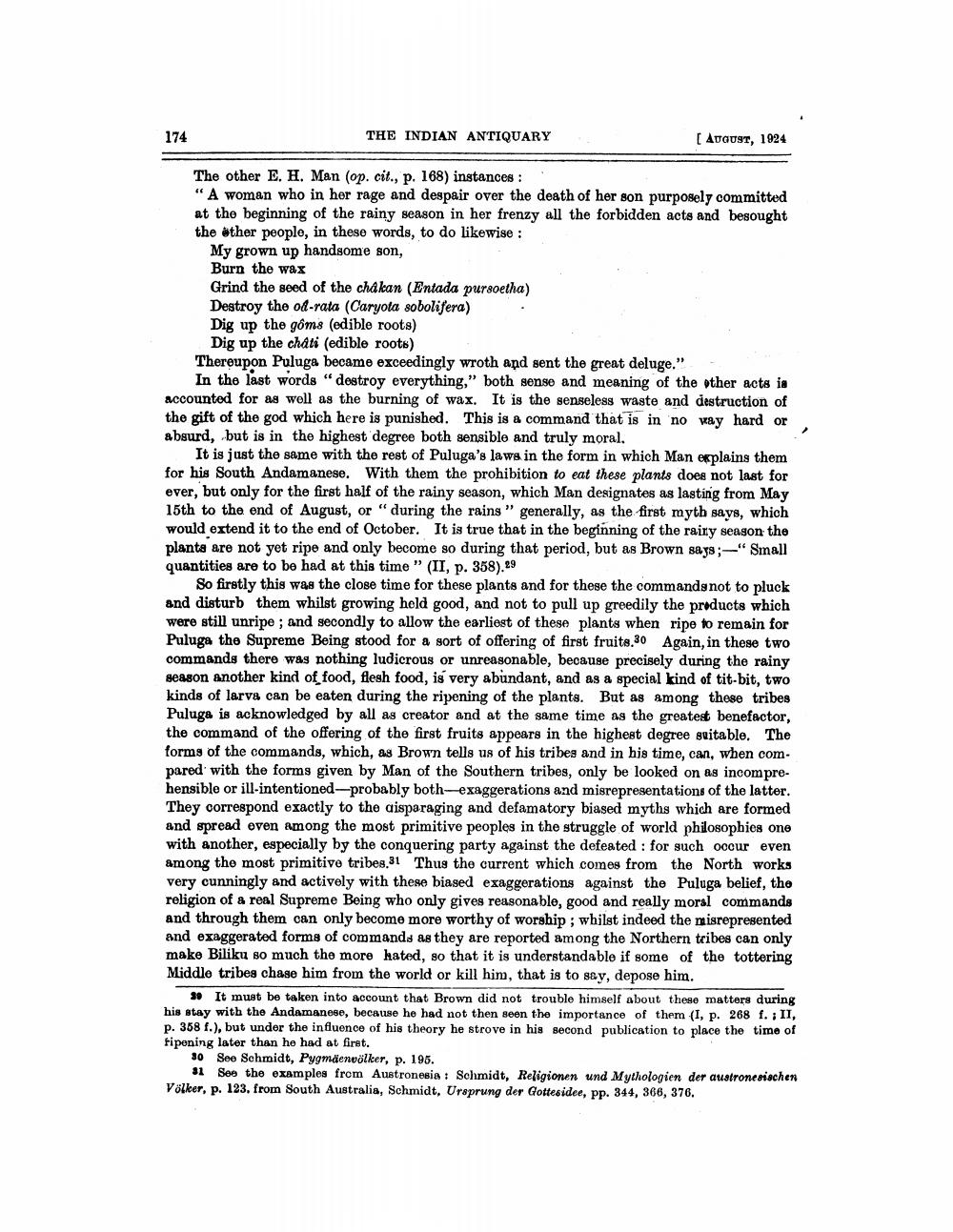________________
174
THE INDIAN ANTIQUARY
[ August, 1924
The other E. H. Man (op. cit., p. 168) instances : "A woman who in her rage and despair over the death of her son purposely committed at the beginning of the rainy season in her frenzy all the forbidden acts and besought the #ther people, in these words, to do likewise :
My grown up handsome son, Burn the wax Grind the seed of the chakan (Entada pursoetha) Destroy the od-rata (Caryota sobolifera) Dig up the gôms (edible roots)
Dig up the chati (edible roots) Thereupon Poluga became exceedingly wroth and sent the great deluge."
In the last words “destroy everything," both sense and meaning of the other acts ia accounted for as well as the burning of wax. It is the senseless waste and destruction of the gift of the god which here is punished. This is a command that is in no way hard or absurd, but is in the highest degree both sensible and truly moral,
It is just the same with the rest of Puluga's laws in the form in which Man explains them for his South Andamanese. With them the prohibition to eat these plants does not last for ever, but only for the first half of the rainy season, which Man designates as lasting from May 15th to the end of August, or " during the rains" generally, as the first myth says, which would extend it to the end of October. It is true that in the beginning of the rainy season the plants are not yet ripe and only become so during that period, but as Brown says:-"Small quantities are to be had at this time” (II, p. 358).29
So firstly this was the close time for these plants and for these the commands not to pluck and disturb them whilst growing held good, and not to pull up greedily the products which were still unripe ; and secondly to allow the earliest of these plants when ripe to remain for Puluga the Supreme Being stood for a sort of offering of first fruit8.30 Again, in these two commands there was nothing ludicrous or unreasonable, because precisely during the rainy season another kind of food, flesh food, is very abundant, and as a special kind of tit-bit, two kinds of larva can be eaten during the ripening of the plants. But as among these tribes Puluga is acknowledged by all as creator and at the same time as the greatest benefactor, the command of the offering of the first fruits appears in the highest degree suitable. The forms of the commands, which, as Brown tells us of his tribes and in his time, can, when compared with the forms given by Man of the Southern tribes, only be looked on as incomprehensible or ill-intentioned-probably both-exaggerations and misrepresentations of the latter. They correspond exactly to the disparaging and defamatory biased myths which are formed and spread even among the most primitive peoples in the struggle of world philosophies one with another, especially by the conquering party against the defeated : for such occur even among the most primitive tribes,31 Thus the current which comes from the North works very cunningly and actively with these biased exaggerations against the Puluga belief, the religion of a real Supreme Being who only gives reasonable, good and really moral commands and through them can only become more worthy of worship ; whilst indeed the misrepresented and exaggerated forms of commands as they are reported among the Northern tribes can only make Biliku so much the more hated, so that it is understandable if some of the tottering Middle tribes chase him from the world or kill him, that is to say, depose him.
30 It must be taken into account that Brown did not trouble himself about these matters during his stay with the Andamanese, because he had not then seen the importance of them (1, p. 268 1.11, p. 368 f.), but under the influence of his theory he strove in his second publication to place the time of ripening later than he had at first.
30 See Schmidt, Pygmdenvölker, p. 195.
31 Soo the examples from Austronesia : Schmidt, Religionen und Mythologien der austronesischen Volker, p. 123. from South Australia, Schmidt, Ursprung der Gottesidee, pp. 344, 306, 376.




